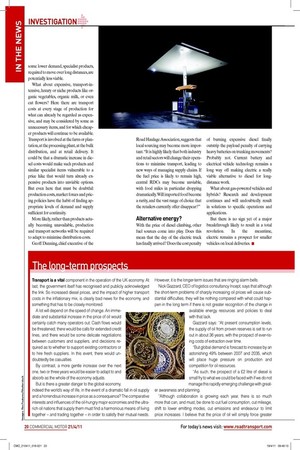The long-term prospects
Page 15

If you've noticed an error in this article please click here to report it so we can fix it.
Transport is a vital component in the operation of the UK economy. At last, the government itself has recognised and publicly acknowledged the link. So increased diesel prices, and the impact of higher transport costs in the inflationary mix, is clearly bad news for the economy, and something that has to be closely monitored.
A lot will depend on the speed of change. An immediate and substantial increase in the price of oil would certainly catch many operators out. Cash flows would be threatened, there would be calls for extended credit lines, and there would be some delicate negotiations between customers and suppliers, and decisions required as to whether to support existing contractors or to hire fresh suppliers. In this event, there would undoubtedly be casualties.
By contrast, a more gentle increase over the next one, two or three years would be easier to adapt to and absorb as the whole of the economy adjusts.
But is there a greater danger to the global economy, indeed the world’s way of life, in the event of a dramatic fall in oil supply and a horrendous increase in price as a consequence? The comparative interests and influences of the oil-hungry major economies and the ultrarich oil nations that supply them must find a harmonious means of living together – and trading together – in order to satisfy their mutual needs. However, it is the longer-term issues that are ringing alarm bells.
Nick Gazzard, CEO of logistics consultancy Incept, says that although the short-term problems of sharply increasing oil prices will cause substantial difficulties, they will be nothing compared with what could happen in the long term if there is not greater recognition of the change in available energy resources and policies to deal with that lack.
Gazzard says: “At present consumption levels, the supply of oil from proven reserves is set to run out in about 36 years, with the prospect of ever-rising costs of extraction over time.
“But global demand is forecast to increase by an astonishing 49% between 2007 and 2035, which will place huge pressure on production and competition for oil resources.
“As such, the prospect of a £2 litre of diesel is small fry to what we could be faced with if we do not manage this rapidly emerging challenge with greater awareness and planning.
“Although collaboration is growing each year, there is so much more that can, and must, be done to cut fuel consumption, cut mileage, shift to lower emitting modes, cut emissions and endeavour to limit price increases. I believe that the price of oil will simply force greater













































